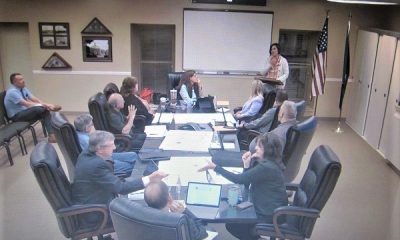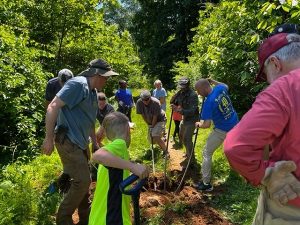Local Government
Divided Front Royal Town Council passes – barely – flat tax rate for FY19
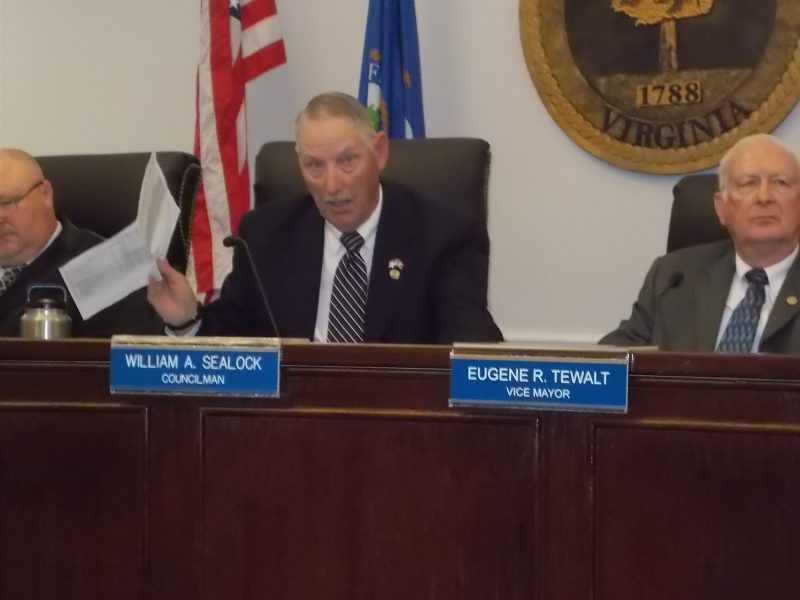
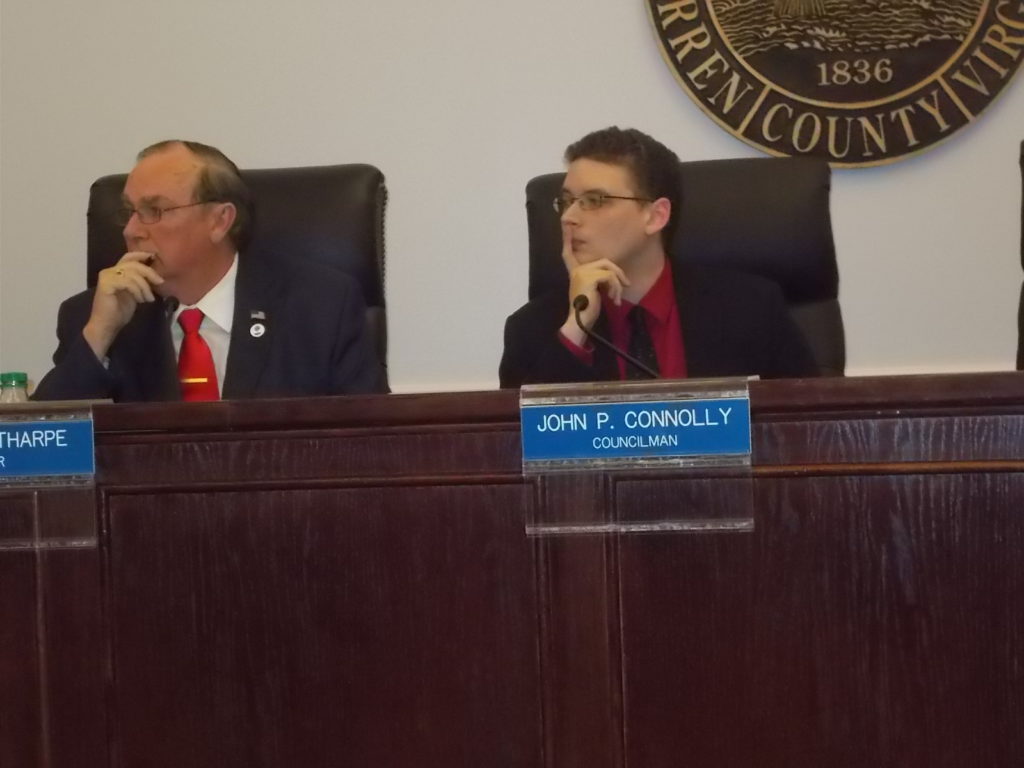

FRONT ROYAL – Honestly, I thought Front Royal wasn’t going to have a tax rate proposed in a game of voting Russian Roulette on Monday night – UNTIL the last man voting at 3-2 FOR flat taxes for Fiscal Year 2019, Eugene Tewalt, prefaced his vote by stating he WOULD vote with the opposing side for a tax rate with no increase to help pay for the new Front Royal Police station. That came as a surprise because Tewalt has been the most critical–well before Monday night–of those on council wishing to defer any tax revenue to pay for the approximately $11-million police headquarters until an annual debt service estimated anywhere from $250,000 to $750,000 comes due.
I mean, I had the first line in the “T” in Tewalt written in the “no” vote column until the former mayor and town public works director explained that despite his disagreement with his no-tax-hike-until-the-bill-is-tacked-to-the-door colleagues, he would vote with them to keep the Town solvent by at least setting a flat tax rate. Tewalt explained that without his fourth vote creating the supermajority necessary for large budget items, like setting tax rates that create a significant portion of the Town’s operating revenue, the town would have no tax rate on the table– and consequently no tax revenue coming in – for FY 2019.
Darn, some common sense in the debate. I fear I found myself anticipating a hardline stand off between the opposing tax revenue and payment sides, William Sealock and Jacob Meza siding with Tewalt, John Connolly, Chris Morrison and Gary Gillespie in the opposing camp – to see which side might blink first facing that FY19 no tax revenue scenario. As Tewalt explained later, due to the two-thirds supermajority requirement, the mayor cannot break a tie in establishing the tax rate – a 4-3 margin not reaching that two thirds requirement.
So, Front Royal’s tax rates will remain flat, at 13.5-cents per $100 of value for real estate and personal property at 64-cents per $100 of value. Also set were a personal property tax relief rate of 60-percent of value on the first $20,000 of assessed value on qualifying vehicles assessed at over $1,000 of value; and a corresponding tax relief rate of 100-percent for qualifying vehicles assessed at $1,000 or less; and adjustment of town codes to accommodate any changes.
According to Town Finance Director B.J. Wilson, real estate tax generates about $1.53 million in annual revenue to the town government. The adopted FY18 town budget was $45,893,820.
John Connolly, absent from the March 12 meeting deadlock and oversight that left the Town without a tax rate for next year, made a motion to set the rates flat. Tewalt then offered an amended motion to raise the real estate rate by the maximum .9-cent allowed by the re-advertisement after council failed to set a tax rate two week earlier when an increase could have been a full penny. Each penny of real estate tax produces about $110,000 of revenue for the town.
In proposing no tax increase, Connolly said he did not consider tax revenue “the Town’s” money, but rather its citizens. And he favored not taking citizens’ money until it was absolutely necessary, particularly with what he called a $1.7-million General Fund cash reserve above legally-required emergency reserves. Tewalt countered that $1.7 million was “nickels and dimes” to a municipality like Front Royal, with a $45-million to $46-million annual budget.
As for emergency reserves, Tewalt said, “This is an emergency to me – you’ve approved an $11-million building and are depending on the (New Market) tax credits (to keep the first seven or nine-year debt service around $275,000) – they could be gone tomorrow.”
Without the New Market Tax Credit program’s interest-only deferment, the annual debt service on the police station has been estimated between $700,000 and $800,000 – also near the amount the tax credit program debt service will reach after the interest-only period disappears.
Tewalt reiterated his point from the March 12 vote, when he told his colleagues, “We can’t keep pulling money out of our reserves … if we add a penny, or close to it tonight we won’t have to add four or five cents all at once in the future. You can’t just wait until the money is needed. If you vote for a project and not to pay for it – I don’t know how some people on this council run their homes.”
Connolly also pointed to the county reassessment now taking place as likely creating higher real estate values producing more revenue in the future. He also said council couldn’t be sure that yet unknown revenue sources such as the corridor agreement with the county wouldn’t crop up and create new revenue sources that could preclude the need for some of the anticipated tax hikes to pay for things like the police station.
However, Tewalt reminded Connolly and his council allies that when reassessments result in higher values that create more revenue to a municipality, state law mandates that a municipal real estate tax rate be “equalized” or reduced so that its revenue stream is returned to the level it was before the reassessment. This assertion appeared to confuse Connolly, who asked Town Attorney Doug Napier whether the council could, as he recalled having been done at the last reassessment, just vote NOT to equalize the tax rate. Napier replied that council could, in fact, vote not to equalize the tax rate. However, Tewalt’s point was that such a vote is a defacto tax increase equal to whatever additional tax revenue is created by the added value placed on someone’s property by the reassessment.
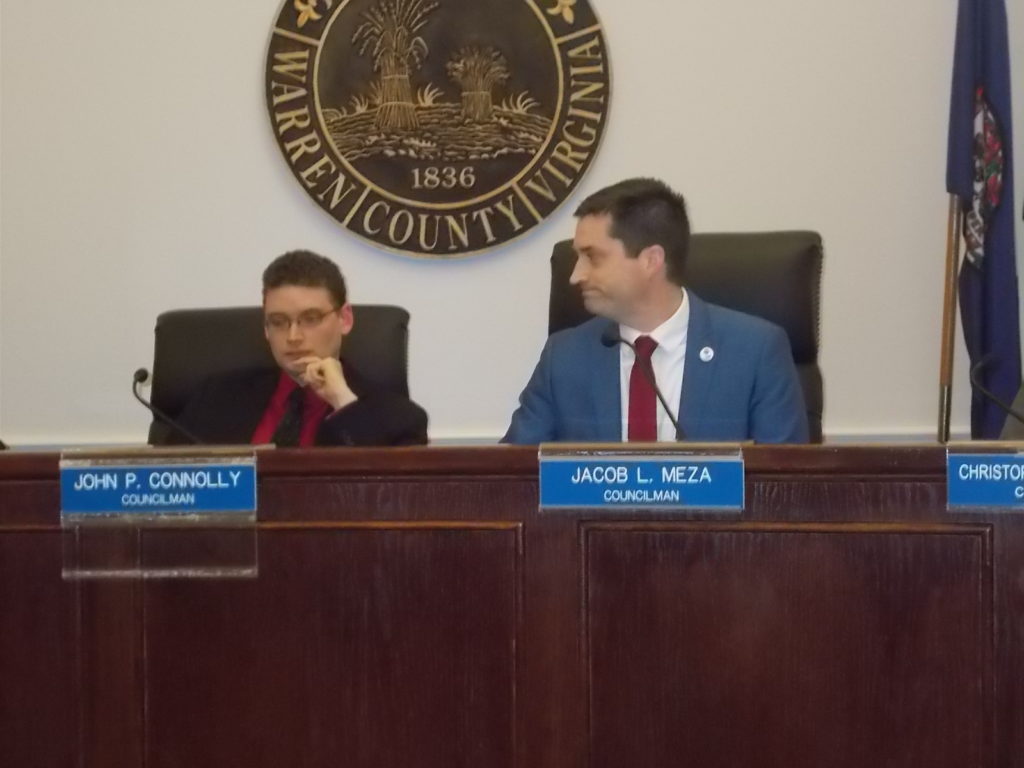

Jacob Meza, right, was skeptical of Connolly’s rosy revenue out of the blue projections; but in the end council may have been relieved to at least have passed a tax rate this time around.
Tewalt also explained that while he did not support building new police station at an estimated cost of $11-million, once his colleagues approved it, he favored continuing the process begun last year with a half-cent increase to the real estate rate to set aside revenue for the eventual annual debt service.
Tewalt ally Sealock pointed out that he had discovered that $55,000 of annual revenue created by the half-cent hike last year wasn’t actually all being put aside, that it was being used to pay rent on the county facility the town police are now located in on Jackson Street. – “It is NOT being set aside as it was supposed to be,” he said.
According to the town finance director, Front Royal paid Warren County $50,537 in rent for the current police headquarters for the period from October 1, 2017 to September 30, 2018. That doesn’t leave much in set aside for future debt service.
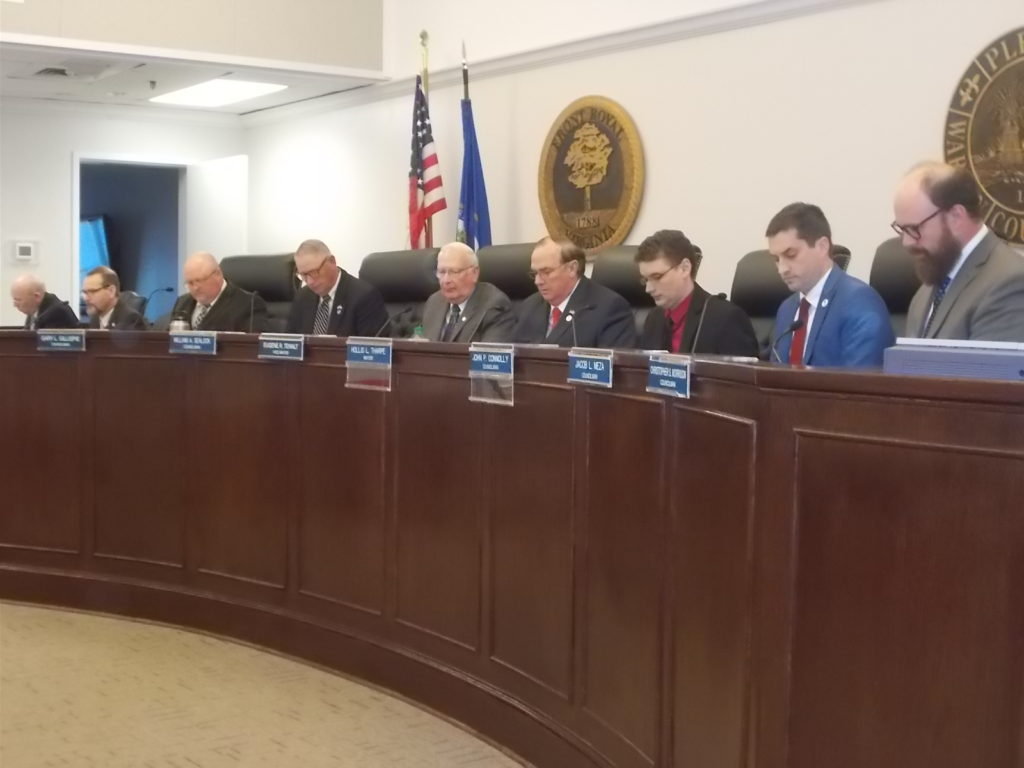

Meza pointed out that even with the .9-cent increase this year added to the half-cent hike last year, only about $160,000 of set aside funding for police station debt service would be created – that is $100,000 short of the best-case, interest-only annual debt service scenario. He said he did not believe Connolly’s plan, particularly hoping for new revenue sources, was a good one – “You don’t buy an expensive car and hope to get a pay raise in the future to pay for it.”
Local Government
Town Council and Board of Supervisors Enjoy a Brief Liaison Committee Meeting
Having come out of a special meeting where they voted approval for a giveaway of trees purchased by the Town, the Front Royal Town Council joined the Warren County Board of Supervisors for a liaison committee meeting hosted by the county at 6 p.m. on Thursday, April 18 in the Warren County Government Center on 220 North Commerce Avenue. Mayor Lori Cockrell and Councilman Glenn Wood represented the council, while Chairwoman Cheryl Cullers and Supervisor Jerome Butler represented the board.


Town Council meets before the Town-County liaison meeting to hold a special meeting concerning permission to be granted to the Advisory Committee for Environmental Sustainability (ACES) to give away trees valued at $6218.75 with a $1000 delivery fee on Sunday, April 21, for an Earth Day event. This $7218.75 value, paid by the Town of Front Royal for trees that the Horticulture Department purchased, covers ACES’ free plant giveaway. The council unanimously approved the giveaway. Royal Examiner Photo Credits: Brenden McHugh.
The items on the agenda were, respectively, the issue of processing house violations and tenant and landlord enforcement, deferred to July; McKay’s Springs; the transportation and infrastructure committee; an update on school zone cameras; the water supply plan; and a boundary line adjustment for Town corporate limits on East/West Criser Road. The meeting was characterized by agreement and goodwill as the Town and County discussed these items that concerned them. At the same time, Town Manager Joe Waltz and County Administrator Edwin Daley provided them with the information they needed to transact the meeting.


Front Royal Town Council and Warren County Board of Supervisors meet for Thursday night liaison committee meeting at the Warren County Government Center.
Mayor Cockrell pushed for clarification on who exactly owns McKay Springs. Daley explained that three years ago, the Economic Development Authority (EDA) sold their portion to the County, thus reducing the stakeholders to two parties, the Town and the County, both of whom currently own portions and a portion they own together. Under the leadership of Daley and Waltz, the Town and the County are now exploring whether they might develop McKay Springs as a joint venture. The transportation and infrastructure committee would facilitate this discussion, and it would be merely a discussion based on information gathering. Cullers then guided the meeting towards the transportation and infrastructure committee itself. At that point, she and Cockrell mentioned reports from VDOT that the Town and County received separately.


Captain Zachary King of the Front Royal Police Department gives an update on school zone cameras to the liaison committee.
After they received an update about cameras in school zones from Captain Zachary King of the Front Royal Police Department and after they heard from Waltz about the annual determination of the Town’s excess volume in water and septic capacity, that is, capacity available for future development, the town manager explained the need for a boundary line adjustment on East/West Criser Road, where in a recent out-of-town service request it came to the Town’s attention that the boundary line does not reflect every segment of the road owned by the Town which, currently, owns segments that are outside of corporate limits, even though the Town owns all the land that East/West Criser Road is built on. The adjustment would bring all segments of the road into corporate limits as well as any segment marginal to the road that the Town already owns. There did not seem to be any resistance from the board to rectifying this oversight.
At 6:50 p.m., all agenda items having been addressed, the meeting was resolved with the determination to hold another liaison committee meeting in July.
Local Government
Town Planning Commission Tackles Motel-Apartment Conversion, Elects New Chairman
The Front Royal Planning Commission, presided over by Acting Chairman Connie Marshner in the absence of its former Chairman Daniel Wells, who submitted his resignation last week, met Wednesday, April 17, to hold public hearings on six Special Use Permit (SUP) applications. Acting Chair Marshner announced that an election for a new chairman would be added to the end of the agenda due to former Chairman Wells resignation. Commissioner Glenn Wood moved to add the election to the agenda, and Commissioner Michael Williams seconded. The commission voted unanimously for the addition.
There were no citizen comments from the nearly empty meeting room, and the commissioners voted unanimously to approve a one-item Consent Agenda, Authorization to Advertise for Public Hearing a single SUP submitted by Abode of Liberation for a lodging house at 1324 Old Winchester Pike.
There were seven public hearings:
Baymont Inn Apartment Conversion
The major business of the meeting was a pair of requests from CCC Enterprises LLC of VA for a property at 10 South Commerce Avenue, which was familiar to residents as the Baymont (former Quality Inn). First was a SUP application to convert the 3-story motel into a 39-unit apartment building. The property is zoned C-1, Community Business District.
Zoning Administrator Ware cautioned the commission that they were being asked to vote only on the proposed use for the property, not the site plan or other permits. The applicants presented a concept site plan showing a mix of one and two-bedroom units around green space and a swimming pool. The configuration as presented included 24 one-bedroom units, 2 one-bedroom with a den, and 12 two-bedroom units. However, the specific mix of units may change as the process moves forward. The applicants have not yet established pricing for the units, as it is too early in the process to determine. The applicants assert that the proximity of the property to the downtown area will be beneficial, as the tenant mix is intended to consist of young professionals and couples rather than families with children. The Planning Department summary indicates that this use is in conformance with the Town’s Comprehensive Plan and could provide badly needed housing. Commissioner Wood indicated “quite a bit of interest” in the project from downtown business owners, who will want to know “What type” of tenants the development would yield.
“What they do not want is for this to become low-income rentals”, Wood said. “I would suggest that as this process moves forward, you should be prepared to address that.” The applicant, Sam Sharma, told the commission that they were looking for local tenants only – predominantly “workforce” – cited as “teachers, firefighters, people who have restaurants on Main Street – that’s the goal we are trying to meet.”
At the public hearing, surprisingly, given the publicity for the proposal, there were no public comments either for or against it.


Sam Sharma, left at the podium, and Kyle Hopkins, the applicants for a Special Use Permit for the Baymont Inn property on Commerce Ave., address the Front Royal Planning Commission to explain their concept of a 3-story apartment structure to provide ‘workforce housing’ adjacent to the downtown area.
The Planning Department’s summary lists only one condition for the SUP: two parking spaces must be provided for each apartment. Acting Chair Marshner asked if “a third party” might be paying rent for tenants. Answer: “No.” After some discussion about the merits of the proposed use, on a motion by Commissioner Matthiae, seconded by Commissioner Williams, the commission voted unanimously in favor of a recommendation for approval by the Town Council.
The second request from CCC Enterprises LLC of VA is a request for a Special Exception for the property also located at 10 S. Commerce Avenue, identified by Tax Map 20A8-22-6, for a reduction in the required parking space size from 10 x 20 feet to 9 x 18 feet, and a reduction of the required parking area setback of thirty feet (30’) from the property lines. The property is zoned C-1, Community Business District. Approval of this exception is a condition of the CUP for the use as apartments, as the property could not be redeveloped under this proposal if the parking changes were not approved. Zoning Administrator Ware explained the requirement to the commission and showed that a boundary setback of 30 feet would eliminate the majority of parking spaces. As proposed, the parking spaces combined result in “a few more” than the 78 required.


Artist’s conception of a 39-unit apartment building where the Baymont Inn now stands at 10 South Commerce Ave.
After further discussion, Commissioner Matthiae made a motion, seconded by Commissioner Wood, to recommend approval. The vote for approval was unanimous.
Other Business
In other public hearings, Karen Reynoso has submitted a request for a Special Use Permit to allow a short-term rental at 1400 Old Winchester Pike. Zoning Administrator John Ware told the Commission that the application and the property were in full compliance with the Town’s ordinances. The property is zoned Residential (R-2). With no discussion on a motion by Commissioner Wood, seconded by Commissioner Brian Matthiae, the commission voted unanimously to recommend approval.
Short Street Properties LLC is requesting a SUP to allow a ground floor dwelling unit at 519 Short Street; the property is zoned C-1, Community Business District. In the business districts residential dwellings are only permitted by SUP. Zoning Administrator John Ware told the commission that this property has a Residential structure in the front of the lot and a commercial use shop in the rear. Due to fire damage, the property has not been occupied for over two years, and the applicant intends to renovate it inside and out


Permit applicant Chris Grady tells the Town Planning Commission that he plans to renovate a property at 519 Short Street as two dwelling units.
Under the town’s zoning ordinance, if a legally nonconforming use has been discontinued for two years, it must be brought into compliance with the current standard. Since the Commercial District allows ground-floor dwelling units only by SUP, the applicant has submitted the request. Property Owner Chris Grady addressed the commission and described the project to restore the vacant, burned-out property to two dwelling units. There were no speakers either for or against the request. Commissioner Wood asked about the presence of stored vehicles at the back of the property, and the applicant said that the owner had agreed to clean up that area prior to closing. The applicant asked if there was a danger that a permit for the use could be denied once the purchase and renovations were complete. Town Planning Director Lauren Kopishke said that was the reason for getting the Special Use Permit before the work is completed, to reduce the denial risk for the applicant. After further discussion on Commissioner Natthiae’s motion, seconded by Commissioner Wood, the commission voted unanimously to recommend approval.
Edwin S. Wright submitted a request for a Special Use Permit to allow a ground-floor dwelling unit at 514 South Royal Avenue. This property is zoned C-1, Community Business District. It was previously in use as a residential dwelling but has been vacant for several years. The applicant plans to renovate the property with two dwelling units, One a 4-bedroom 2-story, and one a basement 2-bedroom. As with the previous SUP request, the legally non-conforming property must now comply with the current Zoning Ordinance to re-establish the residential use. There were no speakers at the public hearing. During the discussion, Commissioner Williams asked if the requirement for parking spaces in the town ordinance had to be met before the permit was issued. Zoning Administrator Ware said that parking spaces were a requirement for permit issuance. On a motion by Commissioner Williams, seconded by Commissioner Wood, the commission voted unanimously to recommend approval.
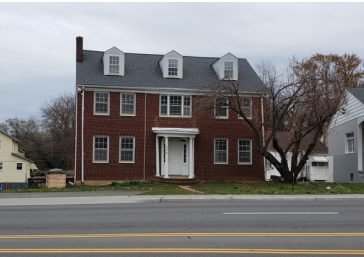

Edwin Wright submitted a proposal for a special use permit for this building at 514 S. Royal Ave for two dwelling units. The Planning Commission voted to recommend approval.
Edwin S. Wright has also submitted a request for a SUP to allow a ground-floor dwelling unit at 512 S. Royal Avenue. The applicant is renovating the property immediately adjacent to the previous plot. The applicant’s plan calls for this formerly derelict building to be converted to two one-bedroom dwelling units, one on the main floor and one in the walkout basement. The property is zoned C-1, Community Business District. As with the previous request, the SUP was required because the legally non-conforming use had expired when the property was vacant. With little further discussion on a motion by Commissioner Matthiae, seconded by Commissioner Wood, the commission voted unanimously to recommend approval. Commissioner Williams and Wood expressed their appreciation for the applicant’s efforts to improve the highly visible properties at the south entrance to the town that desperately needed it.
Chris King-Archer has requested a SUP to allow a short-term rental at 331 Kerfoot Avenue. The property is zoned R-1, Residential District. The Applicant intends to have this 4-bedroom property as a whole-house rental. There were no speakers at the public hearing. The town ordinance for short-term rentals requires one off-street parking space per bedroom, and there are currently only three parking spaces on this property. The planning staff recommended disapproval for that reason, but Commissioner Williams asked the applicant if adding another parking space to comply with the town ordinance was possible. The applicant indicated that it was possible but questioned the consistency of the ordinance application, citing the case of a nearby short-term rental property with no off-street parking.
Planning Director Kopishke explained that the Planning Department could not recommend approval if there were insufficient parking under the ordinance, and in the case the applicant cited, the commission had recommended denial for that reason, but the town council approved it anyway. Town Council can overrule its own ordinance. Town Attorney George Sonnett told the commission that a commissioner could offer a substitute motion to recommend approval, providing that the applicant would provide the additional parking space required by the ordinance. With little further discussion on a motion offered by Commissioner Williams and seconded by Commissioner Wood, the commission unanimously recommended approval of the suggested substitute motion.
After the public hearings, Commissioner Wood nominated Vice-Chairman Connie Marshner as permanent chair to serve the remainder of former Chairman Wells’s term. Commissioner Williams seconded, and the commission voted unanimously for Marshner’s chairmanship.
Planning Director Kopishke reported to the commission that there were 267 walk-in customers to the Town Planning Department in March, 25 zoning permits, 15 business license applications, and 5 code enforcement cases. She also said that the department hopes to have a draft rewrite of the Town Zoning Ordinance in the hands of the commission by the end of June. The rewrite of the ordinance is the last major part of a multi-year fundamental rewrite of the town’s planning and zoning infrastructure, which included updating the Comprehensive Plan and its components.
Another surprise was in store at the end of the meeting when Commissioner Glenn Wood announced his resignation from the board, effective May 16th. The commission “regretfully” voted to accept the resignation and wished Commissioner Wood well.
An urgent reminder: The planning department is recruiting for new Planning Commission Members (now 2). Check out the town website for the application form.
The meeting adjourned at 8:21 p.m.
Click here to watch the Town of Front Royal Planning Commission Meeting of April 17, 2024.
Local Government
Supervisors Approve Three Service Contracts, Debate Liaison Committee Structure
Near the opening of its regular meeting of Tuesday, April 16, the Warren County Board of Supervisors was introduced to new officers and support staff by Sheriff Crystal Cline; board and staff reports followed prior to routine monthly business. Portions of the reports, particularly from Fork District Supervisor Vicky Cook and County Administrator Ed Daley, focused on efforts to further cut departmental or outside agency operational requests in an attempt to balance the County’s Fiscal Year-2024-25 budget without the necessity of additional tax hikes to what has already been forwarded by the board.


Sheriff Crystal Cline, at podium, introduces new deputies and staff to supervisors as she continues to finalize departmental personnel structure. Below, the supervisors continue to ponder expenditures as they attempt to balance tax-based revenue with departmental and outside agency service providers FY-25 budget requests. Royal Examiner Photos Roger Bianchini
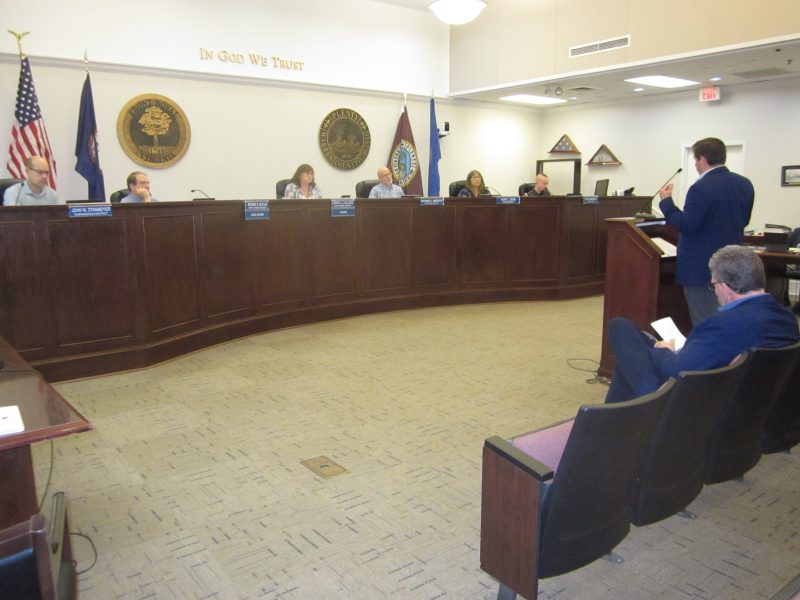

As reported of last week’s special meeting of the board, facing a $7.5 million revenue shortfall on the initially proposed FY-25 budget, the board has targeted tax hikes adding $4 million of revenue, leaving a $3.5-million shortfall the board seems committed to eliminate through further cuts to what they consider non-essential departmental or outside agency requests.
And speaking of requests, the board’s “Unfinished Business” opened the action portion of the meeting agenda with three staff presented contract proposals. Two of them were for renewals or updates of existing contracts, and one regarding tourism promotion from a Request For Proposal (RFP) issued by the County. Those contract items were, in the order presented:
- Contract – ACOM, LLC Contract for Technical Services – staff presentation by Todd Jones, IT Director (20:50 linked video mark); on a motion by ‘Jay’ Butler, second by John Stanmeyer, approved by a 4-1 vote, Ms. Cook dissenting.
- Contract – Earthdiver, LLC Contract for Tourism Website – staff presentation by Joe Petty, County Director of Economic Development (1:05:53 video mark); on a motion by Ms. Cook, second by Richard Jamieson, approved by a 5-0 vote.
- Contract – Civicplus, LLC Renewal of Annual Term Contract – staff presentation by Todd Jones, IT Director (1:09:48 video mark); on a motion by Ms. Cook, second by Mr. Butler, approved by a 5-0 vote.
While the latter two proposals were approved after brief discussions by the board following the staff summaries, the ACOM LLC computer tech services contract drew a lengthy inquiry and questioning of contract dynamics from Fork District representative Cook (beginning 32:42 video mark). The Fork District representative seemed troubled by the condition allowing the contractor to approach the board for additional funding if its annual cap, $35,000 in current FY-2023/24, $34,000 of which has been spent to date Jones told the board, was surpassed. Her mind did not seem eased by the fact a board of supervisors majority must approve the requested additional funding, as well as approve any IT project that arose where funding over $50,000 would be required, as in IT wiring to a new building. IT Director Jones noted the contract wording had been crafted to allow other Virginia municipalities to access needed IT services from ACOM through the Warren County contract. Jones noted such open contracting was a common practice in the state, and helped achieve the best possible pricing through the multiple municipal contracting availability.
The board also heard from ACOM principal Rob Adanitsch (23:50 video mark), who noted the company engaged in proactive community projects like IT instruction for high school students through Samuels Public Library, and contributions to tech-based student scholarships.


Staff, including IT Director Todd Jones at podium and applicant, seated, listen as Supervisor Vicky Cook, top left, questions financial variables in ACOM LLC Technical Services contract renewal request. Below, ACOM principal Rob Adanitsch explained his company’s services and community involvement in bringing IT educational instruction to local students through Samuels Public Library, as well as tech-related scholarship contributions. Four out of five supervisors liked what they heard.
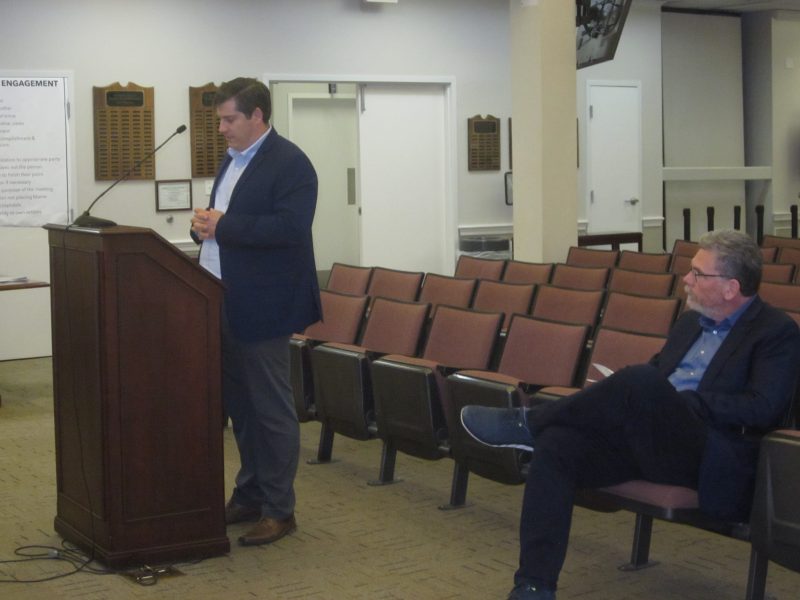

And as noted above, if not Cook, a four-member majority was satisfied with the contract’s dynamics, voting to approve the contract extension for another fiscal year.
On a motion by Mr. Stanmeyers, second by Mr. Butler, the board then unanimously approved a four-item Consent Agenda as presented. Three of those items were Authorizations to Advertise for Public Hearing hangar leases at the County’s Front Royal Airport (FRR), the fourth a Sole Source Award Notice precluding the necessity of issuance of an RFP on a specific pending item.
About that Liaison Committee
The meeting concluded with another somewhat lengthy exploration initiated by Supervisor Cook when Chairman Cullers asked if anyone had any “Additional New Business” to discuss (1:11:05 video mark). Cook expressed some confusion, not only on how board or council members not scheduled as official Town-County Liaison Committee members at a given meeting may offer input, but on the current structure of the liaison committee membership. The Front Royal-Warren County Liaison Committee, which generally meets quarterly, is composed on a permanent basis of the supervisors chairman and the town’s mayor, and one additional county board member and council-person generally rotated alphabetically by the first letter of their last name. The county administrator and town manager are also recognized as permanent members. Other supervisors and council members may attend Town-County Liaison Committee meetings as observers, with no authority to offer input unless recognized by the liaison meeting chairman. The meeting chairmanship is based on which municipality is hosting that quarterly meeting.
In response to Cook’s question on submitting input, Chairman Cullers recounted her experience as board chairman with the recent evolution of liaison committee meetings as the County and Town contemplated creation of a “Joint Tourism System”. She noted that while full board and council attendance had developed during the Joint Tourism discussion, the rules voted and agree upon in December were to return to the two-and-two board/council member format at liaison committee meetings moving forward. Consequently, she had communicated that non-participating board members should submit any questions or points they wanted discussed at liaison to her through the board clerk prior to the date of the next liaison meeting.


Board Chairman Cheryl Cullers, left, and Vicky Cook, right, were not on the same page on Town-County Liaison Committee structure and processes near the end of Tuesday’s meeting. County Attorney Jason Ham, below right, backed up Cullers explanation that the liaison committee has returned to the one-permanent (board chair and mayor) and one-rotating elected bodies liaison committee membership.
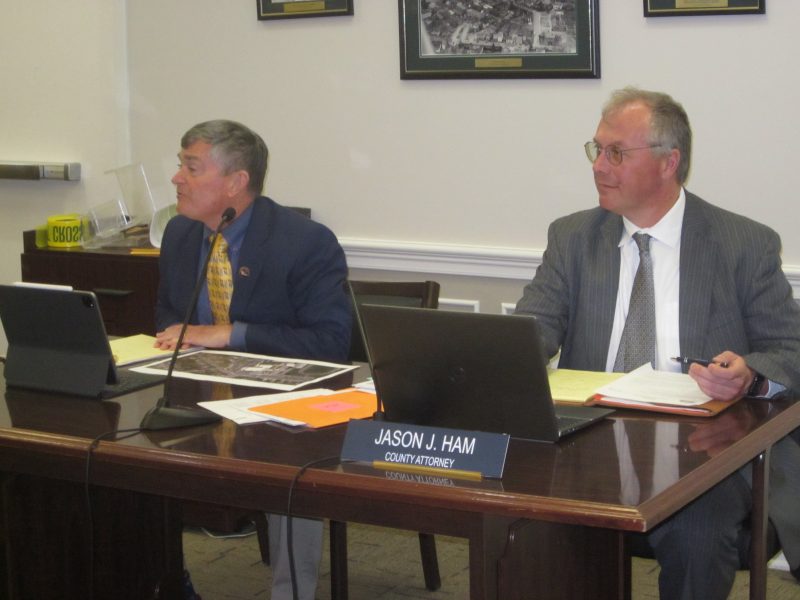

After County Attorney Jason Ham explained the legal rights of non-participating board or council members to attend and observe, but not speak unless recognized by the chair to do so, Cook insisted that full board and council membership was the existing structure of the liaison committee (1:17:40 video mark), to which both Ham and Cullers simultaneously disagreed. However, that did not initially deter Cook from continuing her comment based on an erroneous assumption she asserted she had written proof of.
Cook’s confusion seemed to stem from the fact she was allowed to speak at a liaison committee meeting she attended in January. Board Chairman Cullers explained to Cook that Mayor Cockrell, chairing that meeting hosted by the Town at Town Hall, recognized she had a question and had allowed her to pose it from the viewer’s gallery as a chairman may allow meeting rules to be exempted on occasion as they see fit.
And with that resolved the meeting adjourned just shy of 8:30 p.m.
Click here to watch the Board of Supervisors Meeting of April 16, 2024.
Local Government
County Planning Commission Blesses New Montessori School Proposal at Bowling Green South, and Short-Term Rentals
A near-capacity crowd of over 100 interested citizens filled the Warren County Government Center Meeting room as the County Planning Commission met for its regular meeting on April 10th. The primary interest of the crowd was a public hearing on a Conditional Use Permit (CUP) application filed by John Paul the Great Montessori Academy for a private school in Rockland. Last month, the commission saw a preview presentation in anticipation of the request for a new CUP on a 20-acre portion of the site of the former Bowling Green South Golf course at 768 Bowling View Road, which ceased active operations in 2023. The last CUP issued for that property was in 1981 to Linwood Morrison for a golf course.


County Planning Commission blesses new Montessori School proposal at Bowling Green South and short-term rentals
The Academy was established in 2020, and currently operates in town, with 141 students, 20 full-time, and 18 part-time employees. In its presentation, the applicant indicated the utilization of outdoor space for recess, sports and athletics, recreation, and development of occupations relating to livestock, husbandry, farming, and gardening. The academy does not propose to build new structures but will utilize the existing space and clubhouse structure. Planning Director Matt Wendling told the commission that the proposed use is compatible with the County’s Comprehensive Plan, but in an Agriculturally-zoned area does require a CUP. It is also not contiguous with the Town of Front Royal’s water and sewer network, so it is served by its own private well and septic systems. The majority of the 20-acre plot would be kept as open space. Preservation of the rural character of the county is a key part of the Academy’s mission, according to Noel Sweeney, representing the Academy in addressing the commission.


Applicant representative Noel Sweeney addresses the County Planning Commission to detail plans for a Catholic Montessori School on part of the site of the former Bowling Green South Golf Course, which ceased operations in 2023.
The Academy plans on “utilizing certain portions of the existing golf course for two sports fields and expanding the parking area to accommodate an additional 50 cars.” The student population will not exceed 200. Traffic study calculations provided by the applicant’s consulting engineering firm indicate that traffic to and from the site should be reduced by half from what it was as an active golf course. Compared with other uses that would be permitted by right on that property, such as a wine tasting room or brewery tap room, the school will generate far fewer weekday trips, and almost none on the weekends. Mr. Sweeney reiterated that the Academy has engaged Rockland area residents in dialog regarding the planned use and will continue to do so.
When Chairman Robert Myers opened the public hearing, the overwhelming majority of speakers enthusiastically supported the plan. The very few cautionary comments from citizens did not oppose the school’s plan, but recommended County review to enforce the speed limit on Rockland Road, to protect existing access easements, and review any other traffic control measures to ensure the safety of residents in the area.
After more than 25 speakers had addressed the commission, Chairman Myers closed the public hearing, and the commissioners had the opportunity to ask questions and clarify the conditions of the CUP. Vice-Chairman Henry reflected on the potential need for future accessory structures such as barns or sheds that could be built under an Agricultural exemption, and eventually have power run as necessary for potentially different uses. The commission concluded that without creating too much burden on the applicant, there should be a review mechanism in case additional facilities need to be built that are not foreseen now. After extensive discussion, Planning Director Wendling offered to amend the motion to include a 50-foot setback on accessory structures larger than 256 square feet, and a consent item for modifications to the site plan for review. On a motion by Vice-Chairman Henry, seconded by Commissioner Kersjes, the commission voted unanimously to recommend approval to the County Board of Supervisors. The supervisors will consider the CUP application at their meeting on May 7th.
In other business, the commission considered three other CUP requests.
Joel Didriksen has requested a CUP for a Short-Term Tourist Rental at his property at 3017 Blue Mountain Road in the Blue Mountain Subdivision. The property is zoned Residential-One (R-1) and is in the Shenandoah Magisterial District. Zoning Administrator Chase Lenz told the commission that the applicants have extensive experience managing short-term rentals in Washington D.C., and the Blue Mountain POA Board of Directors has submitted an approval for the permit. The property meets the county’s setback requirement with the nearest dwelling 185 feet to the east.


Conditional Use Permit applicant Joel Didriksen addresses the commission to explain his Short-term tourist rental in the Blue Mountain subdivision. The commission went on to unanimously approve the request.
The applicant told the commission that he and his partner bought the blighted property out of foreclosure and have restored it for their own use as well as a tourist rental. With little discussion, on a motion by Vice-Chairman Henry, seconded by Commissioner Kersjes, the commission voted unanimously to recommend approval.
Jennifer Wynn has submitted a request for a CUP for a Short-Term Tourist Rental at 703 Sunset Village Road. The property is zoned Residential (R-1) and located in the Junewood Estates Subdivision and the Fork Magisterial District. The property does meet the setback requirements of the county’s short-term rental ordinance, with the nearest dwelling 250 feet to the east. The Warren County Health Department review of the request indicated that there are 10 trees planted on the property’s drain-field (that also services an adjoining property by easement) that must be removed prior to final approval by the Board of Supervisors. The applicant indicated the trees would be removed. Without further discussion, on a motion by Commissioner Kersjes, seconded by Vice-Chairman Henry, the commission voted unanimously to recommend approval of the CUP with the added condition of the tree removal.
Jack Donohue – a request for a conditional use permit for a Contractor Storage Yard at (0) Winners Court in the Walker-Brugh Subdivision and the North River Magisterial District. The property is zoned Industrial. Zoning Administrator Lenz told the commission that the property was leased and is being used to store materials and equipment to service the landscaping business on the adjoining parcel. A previous CUP application for that property was approved in 2017, but the use as a Contractor Storage yard was never established, so the CUP expired after two years. There were no speakers at the public hearing. Planning Director Wendling told the commission that the Department heard from the adjoining property owner on the south side of the subject property requesting a visual barrier screening between the two properties, and that requirement was included in the conditions of the permit. On a motion by Commissioner Kersjes, seconded by Commissioner Kaylee Richardson, the commission voted unanimously to recommend approval.
All the requests recommended for approval will now go to the County Board of Supervisors for final action.
The Consent Agenda consisted of an authorization to advertise a public hearing for six items:
Andres Barkil-Oteo – A request for a CUP for a Short-Term Tourist Rental. The property is located at 351 Donna Court. The property is zoned Residential (R-1) and located in the Shenandoah Farms-Riverview Subdivision in the Shenandoah Magisterial District.
Fred & Christine Andreae (Lynx Properties, LLC) – A request for a CUP for a Short-Term Tourist Rental at 6331 Page Valley Road. The property is zoned Agricultural (A) and located in the South River Magisterial District.
Pennoni, Inc. – Mike Artz – A request for a conditional use permit for a Building Height in Excess of 40-feet within the Highway Corridor Overlay District and Commercial Zoning District for a proposed building height of 55 feet. The Commercially (C) zoned property is located at (0) Hospitality Dr. in the Blue Ridge Shadows Subdivision and in the North River Magisterial District.
William Johnson – A request for a CUP for a Short-Term Tourist Rental at 381 Thompson Hollow Road. The property is zoned Residential-One (R-1) and located in the Thompson Hollow Acres Subdivision in the South River Magisterial District.
Michaun Pierre – A request to amend Chapter 180 of the Warren County Code to amend §180-8C to add definitions for Camping Unit and Tent, to modify the existing definitions of Commercial Campground and Commercial Camping, and to repeal the existing definitions of Unit Space, Vacation Camp, Day, and Vacation Camp, Overnight, to amend §180-21D to modify the listed Commercial Campground use and to repeal the listed Vacation Camp, Day/Overnight use in the Agricultural District Regulations, to amend §180-27D to modify the listed Commercial Campground use in the Commercial District Regulations, to amend §180-41 to modify the existing supplementary regulations for Commercial Campgrounds, and to amend §180-57 to repeal the existing supplementary regulations for Vacation Camp, Day or Overnight.
Warren County Planning Staff – A request to amend Chapter 180 of the Warren County Code to amend §180-21 to make Public Schools permissible only by Conditional Use Permit in the Agricultural (A) District; to amend §180-25 to make Store/Dwelling Combination and Library permissible only by Conditional Use Permit in the Village Residential (VR) District; to amend §180-26 to add Church as a use permissible only by Conditional Use Permit in the Suburban Residential (SR) District; and to amend §180-28 to add Church as a use permitted by right in the Industrial (I) District.
The commission voted unanimously to authorize advertisement for public hearings at the next commission meeting.
The meeting adjourned at 8:56 p.m.
Click here to watch the Warren County Planning Commission Meeting of April 10, 2024.
Local Government
Conservatism of Supervisors Challenged by Urgent Need to Raise Tax Rates
Five different representatives of Warren County departments stood before the Warren County Board of Supervisors at a special meeting on Tuesday, April 9, starting at 6 p.m. in the Warren County Government Center at 220 North Commerce Avenue, to explain critical funding needs that they are facing as the County gears up for the 2024/2025 fiscal year. Considering the restraints the local government is operating under with a cost that is two million dollars more than revenue, these critical funding needs come at a time when the only way to cover them, or pragmatically, a portion of them, is to raise tax rates, which is odious to a board that is characterized by conservatism. However, having heard these presentations as well as input from a public hearing, the board sought to strike a balance without sacrificing its core values.
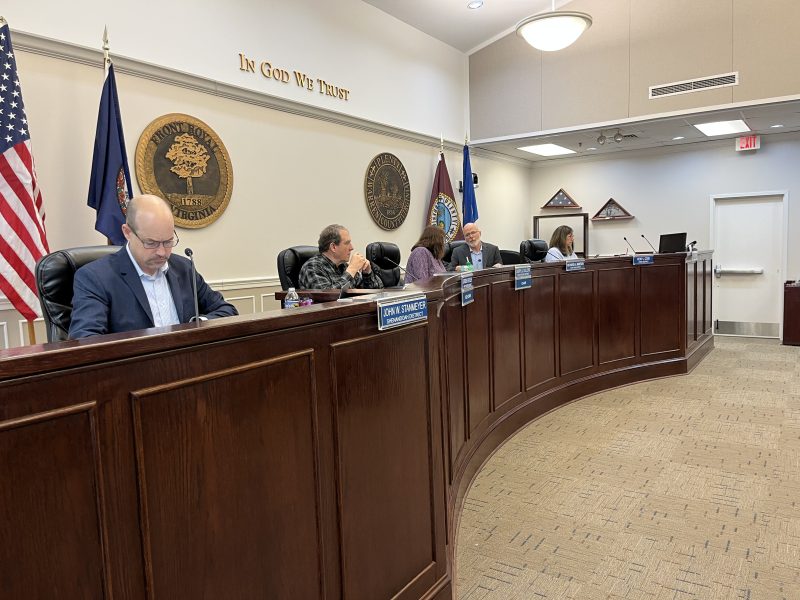

The Warren County Board of Supervisors meets for a special meeting on the evening of April 9. Royal Examiner Photo Credits: Brenden McHugh.
The amount of unfunded service needs presented to the board totals $7,531,756 which stands apart from any cost the County already has. That number is divided into separate categories based on the needs of the various departments, making this “ask”. In an arrangement of possible tax rate increases presented to this reporter by County Administrator Edwin Daley upon arriving for the meeting, amounts of potential revenue are calculated based on increases of one or more cents alongside the percentage those increases represent. In the categories of real estate, machinery and tools, and personal property, the board had a consensus that a selection of tax rate increases needed to be made at that meeting, as kicking the can down the road is no longer feasible. In real estate, which is set at $0.49/$100 assessed, a motion from Supervisor Jerome Butler selected an 8% increase of $0.04 to make $0.53, generating $2,400,000. Accompanying this figure in machinery and tools where the baseline is $2.05/$100 assessed, Butler’s motion selected a 6% increase of $0.12 to make $2.17, generating $96,000. Finally, in a personal property where the baseline is $4.00/$100 assessed, Butler’s motion selected a 7% increase of $0.28 to make $4.28, which generates $1,540,000. Add these figures up and you get roughly $4,000,000. The motion passed with only one “no” from Supervisor Vicky Cook, who felt that a selection of rates that would generate $3,000,000 would be more appropriate.


Chief James Bonzano of Warren County Fire and Rescue addresses his department’s needs with the board.


Sheriff Crystal Cline of Warren County Sheriff’s Office addresses the board concerning her department’s needs
So, the County is now facing a $4,036,000 tax revenue that will assist them greatly as they determine on every front what they can cut and what is imperative. This is the figure that results from computing the rates on the sheet provided by Daley. The money may help Chief James Bonzano in the Fire and Rescue Department to buttress the number of people they employ so that when disasters like the recent wildfires occur, their resources are not stretched to the breaking point; it may help Sheriff Crystal Cline at the Sheriff’s Office to provide her team with the vehicles they need as well as the ballistic vests they need, along with a replacement of a camera system and the execution of final payment on radio equipment; it may help Todd Jones in Information Technology as he seeks to keep his resources in fine working condition and optimally secure; it may help Alisa Scott in Finance and Purchasing as she negotiates asset replacement needs; and it may help the superintendent at Warren County Public Schools as they deal with issues ranging from covering the cost of substitutes to making sure the playgrounds are well mulched.


Director of Technology Todd Jones of Warren County Information Technology addresses the board concerning his department’s needs.


Finance Director Alisa Scott of Warren County Finance and Purchasing explains to the board a list of asset replacement needs, grouped under “other assets” in the list of categories for which the board was considering raising tax rates to cover.


Finance Director Robert Ballentine of Warren County Public Schools addresses the board concerning the school system’s needs.
Supervisor Richard Jamieson spoke at length in comments from the supervisors before the vote. “This is a surreal situation,” he said. “I was elected. I said I was a lifelong conservative. I am a conservative.” He sympathized with every citizen who spoke in the public hearing against raising taxes. “I am that person,” he said. “But I didn’t never campaign to raise taxes; I campaigned to prioritize county government working within its means to manage taxes.” He went on to say: “Lest anyone think I’m naïve about financing, I’ve been a businessman for thirty-plus years.” Although he recognizes its imperfections, he sees how much potential this county has. “The people presently running the county care about the county; they want the county to thrive. They want the county to be healthy.” But he sees the county at a place where it can no longer kick the can down the road. And, of course, the county cannot print money. He is fully aware of the ghosts that haunt this community, like the EDA scandal and the questions about how the school system uses money. But we are not helpless. He recalls his campaign slogan: “Deal responsibly with the past and plan for the future.” If leadership requires an uncomfortable decision like the one the board had to make on Tuesday evening, then that decision must be made, in Jamieson’s view. Help us comb through the budget at future meetings, he urged the audience. Perhaps Jamieson discovers Warren County as Margaret Thatcher discovered England: either regulated in all the wrong ways or not where regulations are desperately needed. The analogy certainly extends to the willingness to be hated in the line of duty.
Having voted in favor of the tax increase, the board adjourned at 9:15 p.m.
Click here to watch the Board of Supervisors Meeting of April 9, 2024.
Local Government
Closure Sighted on the Horizon for Town Council’s Ongoing Discussion of Poultry in Urban Agriculture
Among several items on the Front Royal Town Council’s agenda for Monday, April 8, starting at 7 p.m. in the Front Royal Town Hall at 102 East Main Street, was a revisitation in this work session for the final time before a vote at the council’s regular meeting on May 27, of a proposed amendment to Town code regarding poultry in urban agriculture. This is an issue that has sometimes sparked contentious discussions between council members. Councilwoman Amber Morris has spoken at length, expressing strong views in favor of a more hands-off policy on regulating urban agriculture, specifically as it relates to poultry.
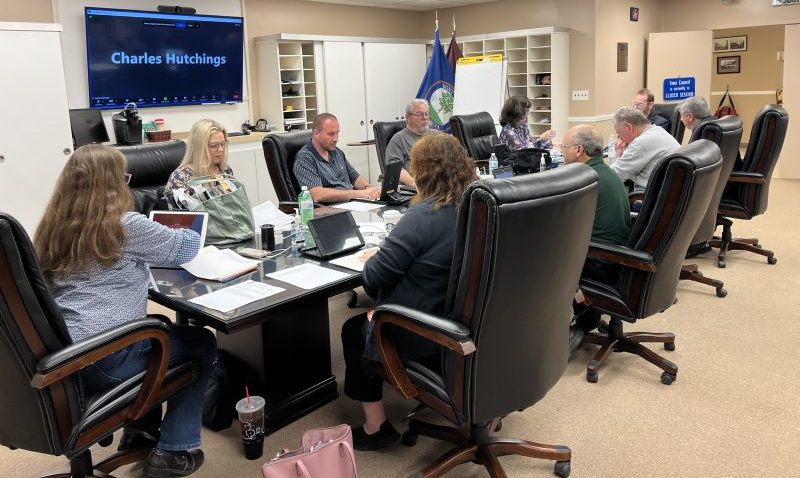

Town Council meets for Monday night work session. Royal Examiner Photo Credits: Brenden McHugh.
As Planning Director and Zoning Administrator Lauren Kopishke explained to the council, staff has discovered contradictions in the Town Code pertaining to urban agriculture, and it stands in need of revision, regardless of whether the council reaches a consensus about the number of chickens allowed within Town limits and the square footage for coop and run space required. Councilwoman Morris acknowledges that she may not win this point. Still, she maintains that the requirements for four square feet of coop space per chicken and eight square feet of run space per chicken, requirements that are already practiced but not codified and would be codified by this amendment, are unreasonable. She would like to see chickens have the liberty to free-range in urban agriculture. However, the amendment would enforce the keeping of poultry in an enclosed, covered, secure, movable, or stationary coop, always with the requirements in terms of square feet. If the amendment passes, the number of chickens allowed for any permit holder will remain at six.


The council undertakes a virtual VDOT presentation. Adam Campbell of STARS (Strategically Targeted and Affordable Roadway Solutions) presents to the council on behalf of VDOT proposed solutions for safety concerns in the 340/522 corridor.
“When we ask this of Council,” Kopishke said of herself and her fellow staff members in an interview, “there is no corruption or malice behind the ask, no ulterior motive. It simply lets us reduce conflicts in the code so that we can do our jobs.” Aside from unifying, condensing, and removing discrepancies in the code, codifying the square footage requirements would give teeth to a practice already in place. Kopishke says that when permit holders do not abide by the uncodified requirements, inevitably, problems will arise that staff can address, like the accumulation of feces in a confined space. “Staff wants these policies standardized so that we can ensure these animals won’t be kept in anything less,” Kopishke went on. “So that when we go back for reinspection, we can ensure the welfare of the animal is being maintained.” She adds: “I can’t guarantee that when someone walks out the door with their approval, they built that coop and ran to our standards until I put eyes on it. Typically, that’s one year later unless I receive a complaint.”
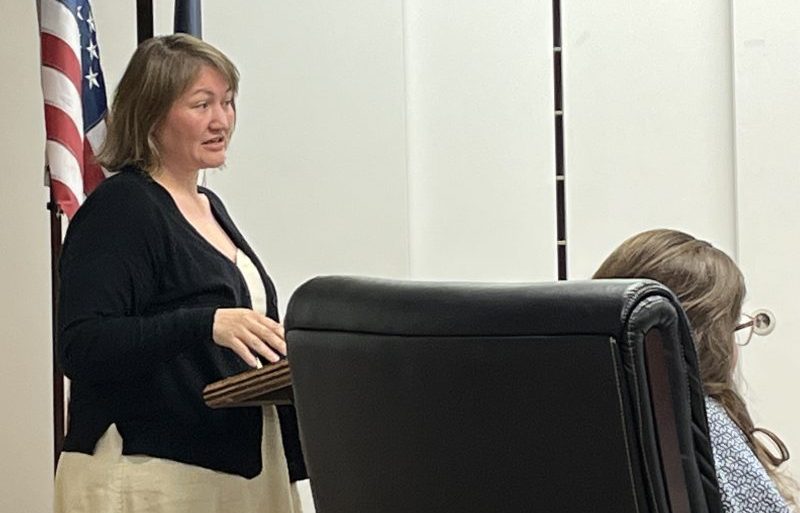

Planning Director/Zoning Administrator Lauren Kopishke stands before the council twice on Monday evening to present a proposed edit and streamline of ordinance regarding spot blight abatement as well as an amendment to Town code related to urban agriculture.
Having discussed other complicating factors like whether commercial use would be allowed, which would not be under the proposed amendment, the council resolved to vote on this item at the May 27 regular meeting, as April’s regular meeting is coming soon enough that staff would not be able to advertise for the public hearing properly. Upon completing their agenda at 9:30 p.m., they went into a closed session.
Click here to watch the Front Royal Town Council Meeting of April 8, 2024.












